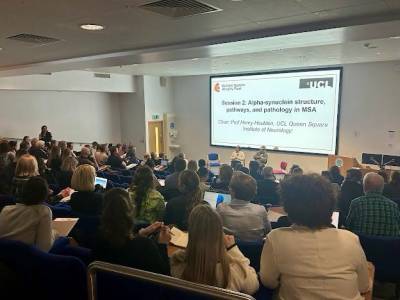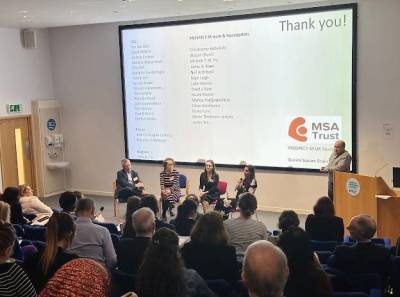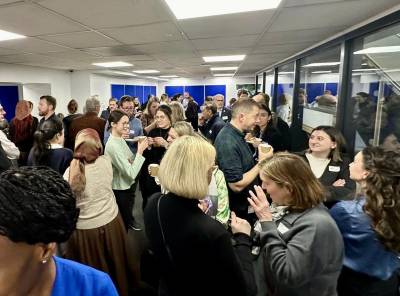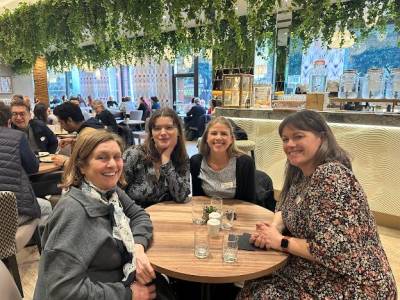In February 2024, UCL Queen Square Institute of Neurology and the MSA Trust a co-hosted the second MSA Research Symposium, led by Dr. Viorica Chelban from UCL Queen Square Neurogenetics Lab.
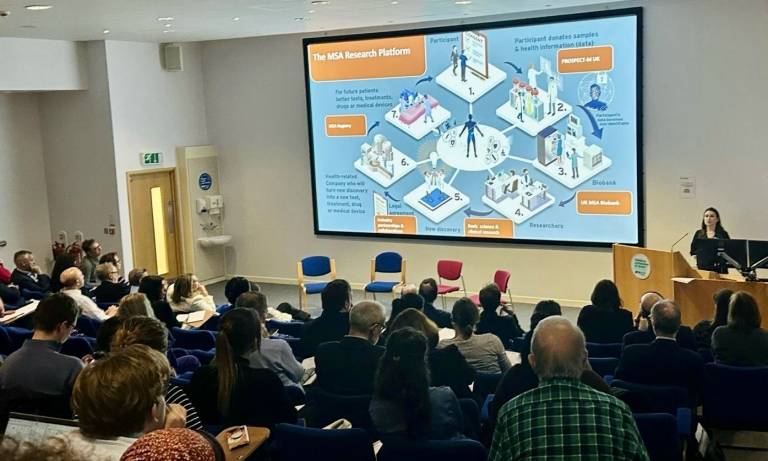
The event, sponsored by Ionis Pharmaceuticals and Theravance Biopharma, brought together over 120 attendees from various fields, including clinicians, scientists, specialist nurses, and industry partners.
The talks are now available online. To access the recording, please visit the UCL Queen Square Institute of Neurology’s YouTube channel or via the direct link to MSA Research Symposium 2024 recording.
MSA genetics and biomarkers
The symposium focused on early stages of Multiple System Atrophy (MSA) and delved into advanced diagnostics, biomarkers, and interventions. Professor Sonia Gandhi (Francis Crick Institute and UCL Queen Square Institute of Neurology) opened the event, emphasizing the MSA Trust's vision to find a cure. Expert speakers, including Professor John Hardy (UCL Queen Square Institute of Neurology) and Professor Claudio Soto (University of Texas Medical School, USA), shared insights on MSA genetics and new promising biomarkers using synuclein seed amplification assays that may play a crucial role in allowing differential diagnosis of those affected by alpha-synuclein related conditions such as Parkinson’s disease and MSA.
Discussions continued with sessions chaired by Professor Henry Houlden (UCL Queen Square Institute of Neurology) covering topics from alpha-synuclein structure, pathways, to genetic risks associated with MSA. Professor Stephan Gentleman (Imperial College London) discussed his research on characterizing different alpha-synuclein strains and their implications for MSA. Professor Sonia Gandhi explored the role of oligodendrocytes in synucleinopathies, while Dr. Maria Xilouri (Biomedical Research Foundation of the Academy of Athens, Greece) highlighted targeting autophagy for combating alpha-synuclein-related pathology. Dr Viorica Chelban (UCL Queen Square Institute of Neurology) provided latest updates on the role of genetic testing in the MSA clinic with a focus on challenging blended phenotypes. Dr Christopher Kobylecki (Manchester Centre for Clinical Neurosciences, Salford) chaired the session on “MSA Research: From Patient to Bench and Back to the Patient” with talks covering best practices in establishing biobanks for neurodegenerative disease research by Dr Amanda Heslegrave (UCL Queen Square Institute of Neurology), the latest in neuroimaging tools for MSA diagnosis with Prof Nicola Pavese and Dr Jacopo Pasquini (Newcastle University), and new research into improving communication in MSA patients by Professor Anja Lowit (Strathclyde University, Glasgow).
Clinical hurdles in diagnosing and treating MSA in its early stages
A large part of the MSA Symposium was dedicated to exploring clinical hurdles in diagnosing MSA in its early stages and providing updates on ongoing drug trials for the condition. Chaired by Professor Michele Hu (University of Oxford), the clinical session featured insightful discussions from Wendy Phillips (Addenbrooke’s Hospital, Cambridge, UK) who highlighted functional neurological disorders with symptoms similar to those of clinical MSA. Additionally, Professor Kailash Bhatia of the UCL Queen Square Institute of Neurology offered valuable insights into early-stage disease mimics, clinical challenges, and diagnostic pathways. Dr. Yee Yen Goh, also from the UCL Queen Square Institute of Neurology, shared clinical markers of prognosis in MSA, while Dr. Valeria Iodice introduced the recently launched autonomic prodromal study (QSA-Prodromal), shedding light on its potential impact in the field.
The MSA Symposium wrapped up with a session on ongoing drug trials for MSA, overseen by Professor Nick Wood from the UCL Queen Square Institute of Neurology. Dr. Iodice shared developments in the longitudinal analysis of ampreloxetine treatment for neurogenic orthostatic hypotension in MSA patients, while Katy Meilleur of IONIS Pharmaceuticals provided updates on the antisense oligonucleotide therapy for MSA through the Horizon trial. In his closing remarks, Professor Bhatia, chair of the MSA Trust, reflected on the stimulating discussions of the day, emphasizing the significant progress made and the ongoing momentum in MSA research. His remarks underscored the collective commitment among researchers to advance understanding and treatment of this complex condition.
“A high-quality day of scientific presentations”
The attendees appreciated the event for its organization and insightful presentations. One participant expressed gratitude, stating,
"Thank you for an excellent meeting. The breadth of the presentations was fascinating, and I learnt a lot."
They also highlighted the value the symposium held for younger colleagues, noting its usefulness for networking and gaining input for research.
Another attendee commended the accessibility of the event, remarking,
"Thoroughly enjoyed meeting you all and the fact that I was able to follow all the sessions without a science background just shows how accessible you all made your fantastic research to attendees."
The symposium was also recognized for its informative and well-planned nature, with one attendee stating,
"It was a pleasure to attend such an informative and well-planned research symposium with experts in the field of MSA."
Others praised the symposium's organization, balanced agenda, and high-quality presentations.
One participant remarked,
"It was a very well-organized, well-balanced, high-quality day of scientific presentations."
Attendees also appreciated the symposium's location in the heart of London, as well as the ample provisions of food and drinks, adding to the overall positive experience.
Overall, the symposium served as a milestone in collective efforts to combat MSA, showcasing recent advancements and fostering a collaborative community dedicated to addressing this challenging disease.
Karen Walker, Eleanor Jarvis, Emma Rushton and Emma Saunders from the MSA Trust.
Links
YouTube Widget Placeholderhttps://www.youtube.com/watch?v=mjvMEYrVzyM

 Close
Close


